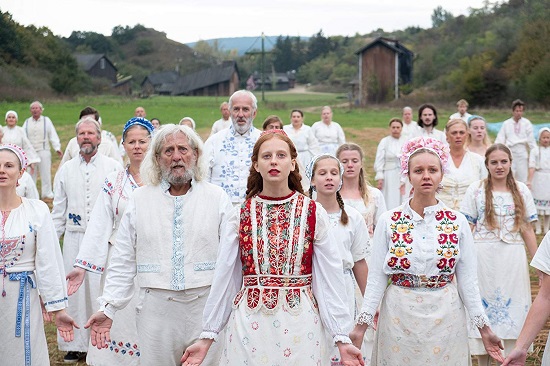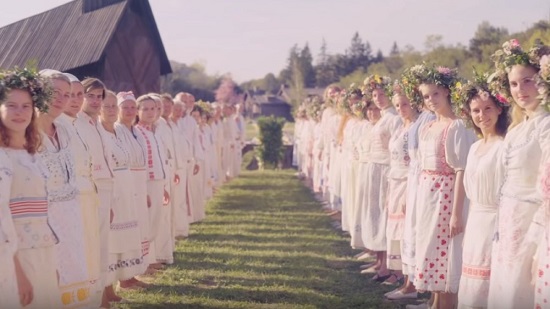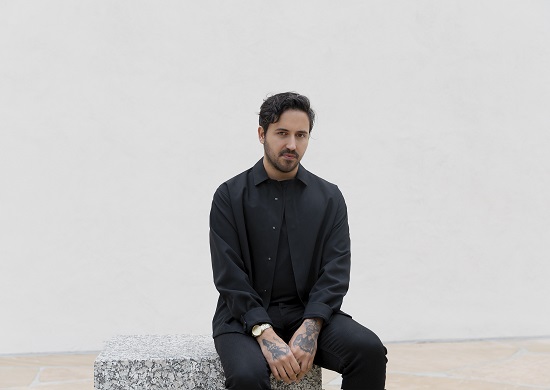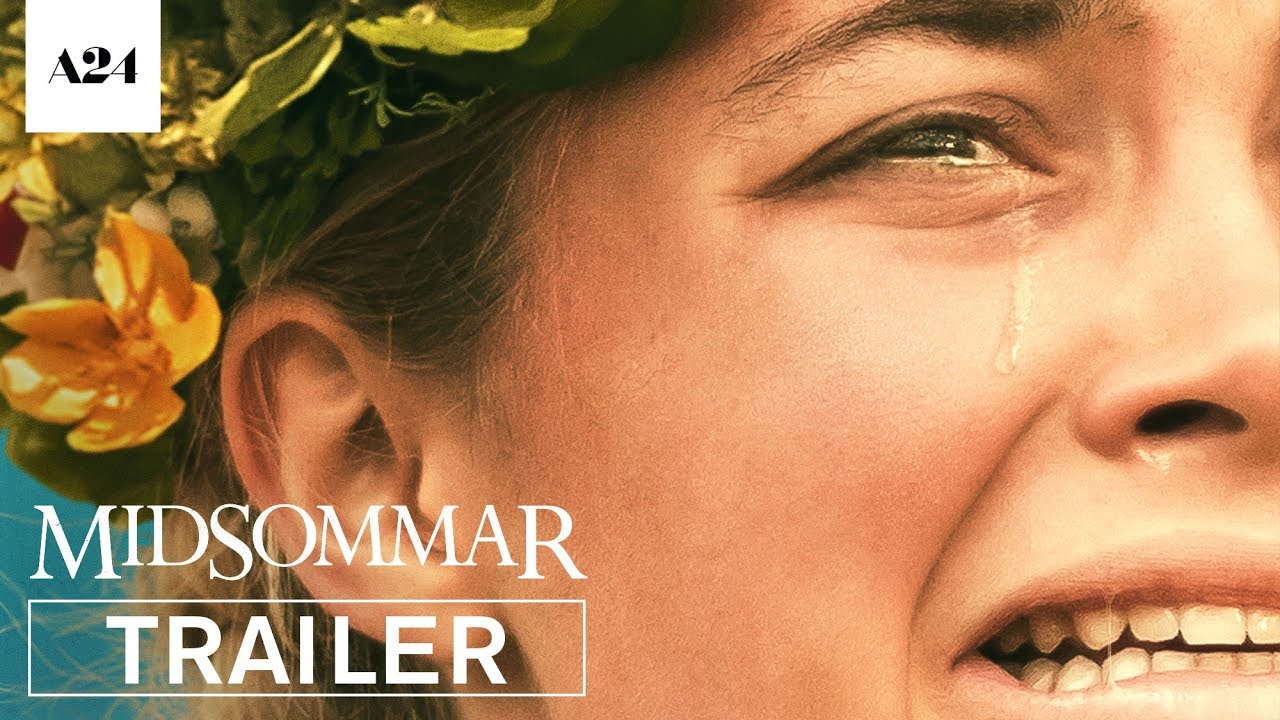Photo by Corinne Schiavone
When Ari Aster was writing the plot of his new film Midsommar, he had only one man in mind for its score. The director, who wrote the film before his extreme, extraordinary first feature film Hereditary had set him apart as one of modern horror’s most inventive auteurs, wrote its follow-up listening to the music of Bobby Krlic, better known as The Haxan Cloak.
One of many, many reasons that Hereditary felt so shudderingly effective, subversive and forward-thinking, was the director’s use of music. Colin Stetson’s score, its screeching peaks of shrill terror and its dirgelike depths of shuddering and rumbling resonance. Krlic’s work for Midsommar is no less remarkable, and yet completely different.
The music, sweeping and gorgeous like the bright, beautiful Scandinavian landscape in which the film takes place, finds the hidden horror therein. ‘A twisted fairytale’ inspired by vintage Disney scores, and crackling, saccharine Sinatra recordings on Capitol, it’s disturbing in a way that at times it’s hard to put your finger on. The film itself makes prominent use of diegetic music in the form of ritualistic chanting, but thanks to a formidable depth of research into Nordic folklore, myth and legend, which saw Krlic tap up no lesser source than Björk, it feels genuinely ancient, tapping into the kind of nightmare so unsettling it feels like it’s been building for millenia.
It was a deeply collaborative process, says Krlic on the phone from a getaway in Santa Barbara, one that saw Aster and Krlic meticulously plan each and every movement for ten hours a day. A shared vision was there from day one, he says. “When I saw Hereditary in the cinema I looked at [Ari] and just said ‘Jesus Christ man, that was a lot!’,” he recalls. “He looked at me with a big smile on his face and said ‘Midsommar’s gonna fuck people up even more, don’t you worry!’”

What was your reaction when you found out Ari Aster had written the film while listening to your music?
BK: It was really flattering! He got in touch with my agent, who mailed me and said ‘we’ve got this guy, we think he’s really great, he’s written this film while listening to your music, and you should meet him’. I watched his shorts and thought ‘this guy’s a complete genius’. He had a lot of ideas that appealed to my sensibilities. It was January 2017 when we first met. Hereditary wasn’t even a thing then. He came over and we just spent a few hours together just chatting about our love of film and all the music that we love.
What exactly did you find you had in common?
BK: I think a lot of it was a shared propensity for very dark humour. We talked a lot about Peter Greenaway and how you can find comedy in absurdity. We talked about things like Chris Morris and Brasseye, subversive comedy, and also a love of horror. The Shining is a favourite film for both of us. The same things seemed to make us tick, and not only did we like the same things but we liked the same things about the same things.
When Hereditary came out, what did you make of the use of Colin Stetson’s music in that film?
BK: I thought it was awesome! I thought it was a really unique take on horror. I was a really big fan of Colin’s and when Ari and I first met he told me he’d asked Colin to do Hereditary and I thought that was really great. Seeing it in the cinema you notice there’s a lot of subliminal stuff with sound and very low frequencies.
At what point did you start writing your own music for Midsommar?
B: Fairly quickly, because it was written into the script that there were scenes with atonal, wordless singing, and we needed music for the ritual scenes. That was the first port of call, it had to be written before the filming started so it could be performed on set. I ended up doing a lot of research into old Nordic and Scandinavian music, Icelandic music too, and the sort of instruments we wanted to use. We were pretty clear that we wanted to go as deep as we could, and we wanted it to be as authentic as it could.
Tell me a bit more about how the film makes use of diegetic music
B: There’s this book in the film that they have that contains this sacred scripture that they’ve been writing forever in this community, and they have an oracle that gets born and they decide on the scriptures that get read from the book. There’s a village band too, for want of a better word. The main thing was that it was such a fantastical place we wanted to craft together. We didn’t want it to feel that people had just learnt these songs, we wanted it to feel generational, something that’s embedded in their culture.
What sources were you using to research?
B: A lot of books, we went to the library and got a lot of books on old Scandanavian music, but also tapping up friends to ask them. I asked Bjork, we’ve worked together before and she is an incredible source of references on Nordic history and Scandinavia.
When you first started writing had Hereditary come out?
B: It had
I’m wondering how hard it must have been to write knowing that Colin had done such incredible things before you…
B: It’s great to appreciate things and there’s always a barometer for what is good, but it can be quite poisonous to have that attitude to stuff. I will admit, though, when I saw Hereditary for the first time in the cinema Ari was sat next to me and I looked at him with my eyes wide open, I definitely felt like the pressure was on! Not just in terms of the music, but because I was blown away with just what an incredible filmmaker this guy was.
The film has this really bright colour palette; it looks very beautiful in addition to being horrific. Did you work with a similar palette with your music? A lot of the moments of the record are beautiful to listen to.
B: One of the main things we talked about was that Midsommar, it’s not a horror film really. It was very clear that the approach that we had was of a twisted fairy tale. I was listening to a lot of Disney scores and old Capitol Records recordings of like, Frank Sinatra, and really trying to draw from those traditional orchestral recordings, to really try and make that terrifying.
The film sees to find a hidden darkness in the pastoral. What are your experiences of nature?
B: I grew up in Yorkshire, very close to a lot of expansive countryside and nature. When we were kids, my parents were very much into going for big walks every Sunday and always trying to get out. I grew up running around fields, being in nature. There’s a place called the Yorkshire Sculpture Park, we’d go there as I got older and I’d hang out with my friends there. It was a great place to watch the seasons changing and it would always be inspiring while I was there and I’d always go home and write music afterwards. I’ve always had this idea of music being connected to environment and nature.
Do you get out to the countryside around your home in Los Angeles now?
B: Absolutely. That was a big draw, aside from work stuff, about moving to LA, the amount of incredible scenery and countryside. I’m such a visual person, I kind of need to be stimulated by that stuff. I don’t get as stimulated by music, surprisingly enough, as I do by images and surroundings.
Your music as Haxan Cloak has been called ‘dark’ and ‘unsettling’ in the past, how fair do you think that is?
B: I do think it’s fair that people say those things about my music, but I do hope that Midsommar doesn’t get tarred with the same brush. It’s an opportunity for people to see the sides of music that I’m interested in exploring. It does get a bit tiring when I turn my hand to anything and people say ‘Oh, the doom-monger strikes again!’ Because at the end of the day I’m just interested in all areas of music, my mum was a DJ and my dad was a blues guitarist, I’m classically trained at guitar, there’s always been so much music happening when I was younger that there’s a pretty broad spectrum of what I’m into. Those two [Haxan Cloak studio] records are just two glimpses into two ideas. There’s a lot more that I want to do and say, and I hope Midsommar is indiciative of that.

Listening to the soundtrack, two particular pices really stuck out. ‘Chorus Of Sirens and ‘Language of Sex’. Listening to them you can find horror in beauty, and beauty in horror. Was that intentional?
B: Definitely. I’ve always wanted to play with that, and I think it’s not even really about making people feel uncomfortable. It’s more about questioning what your response is, listening deeply, and the idea that something might not be what it first appears to be on the surface. Part of my sensibility, and something that Ari and I talked about in the beginning, is that I do think there is a beauty and a comedy in darkness. That’s quite an important thing to explore and I think that the reason that people might find it uncomfortable is it makes them feel uncomfortable that they’re having a reaction to something.
Horror as a genre is very silly sometimes
B: Definitely, and there’s parts of Midsommar that are just completely absurd, in a really wonderful way.
Midsommar strikes me as a hugely collaborative project between you and Ari. What were the differences between this and your previous soundtrack work?
B: It was kind of a new way of working where actually Ari came to my house and spent a week with me, and we sat in my studio for 10 hours a day. I would sit at the piano and we’d watch the film and I’d play, and he’d just be responding to what I was playing. Saying stuff like ‘that’s great, hold that, how can we move that to this emotion, look at Florence, look at what her eyes are doing’. It was an incredible and very true collaboration between the two of us to get to where the music got to. It’s all about carrying the emotional weight of the characters. It took someone who had written those characters to kind of really help push what the emotions were that we really needed to be conveying to the audience.
Lastly then, what’s next for you?
B: I’m working on a new record! I’ve spent the past five years building a studio and really working on a lot of different ideas and learning a lot of new instruments. Production and engineering techniques… there’s a lot of things ready to go into a new record. There’s some really interesting TV that I’m scoring, a show for Hulu called Reprisal that’s by the producers behind Fargo and The Handmaid’s Tale. I’ve been working with Father John Misty a lot, so some of that will hopefully start seeing the light of day next year. There’s quite a few things happening!




